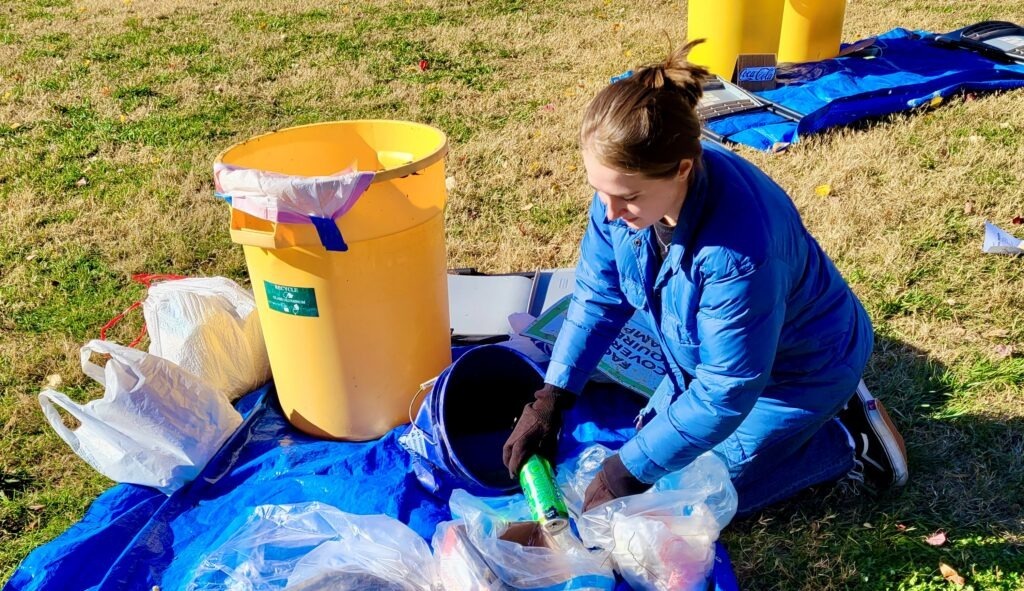UMW’s Humanist Society conducts a brand audit, collecting over 30 pounds of trash around campus
4 min read
UMW Humanist Society students picked up trash around campus and sorted it by brand. | Kenya Carter/The Blue & Gray Press
by JULIA TAYLOR
Staff Writer
Due to staff error, a previous version of this article stated that both UMW’s Humanist Society and Community Outreach and Resources organized and conducted the brand audit. The Humanist Society alone organized the brand audit, using some garbage from an unrelated trash pick-up led by Community Outreach and Resources.
On Friday, Nov. 19, students from the UMW Humanist Society conducted a brand audit, collecting a total of 39.41 pounds of garbage from on and around the UMW campus and sorting it by the brand that manufactured the product. After the event, the club published a report analyzing how many pounds of trash were found from each brand.
After sorting the garbage, they found that the majority of the trash, 33.5 pounds to be exact, was considered miscellaneous, according to their report.
“We found that most of our miscellaneous pile contained larger pieces like wood, alcoholic trash, cigarette buds and McDonald’s bags,” the students wrote in the report.
Weighing in second at 2.3 pounds was UMW branded items and other campus-specific trash such as Vocelli Pizza boxes and old UMW signs. This was followed by PepsiCo at 2 pounds, Coca-Cola at 1.21 pounds, Mars Co. at 0.3 pounds and Nestle Co. at 0.1 pounds.
A small portion of the trash was given to the Humanist Society from an unrelated trash pick-up by Community Outreach and Resources, according to Humanist Society President Ava Spencer, a junior environmental science major.
According to their report, the Humanist Society focused on the outskirts of campus because they believed the campus to be “fairly clean.”
The students found that the majority of trash came from around the athletic field, Route 1 and the physical trash plant near the athletic fields. Much of the trash near the physical plant consisted of bulk trash, such as old filing cabinets and furniture that could not be picked up, and most of the trash near the athletic fields were Gatorade bottles.
On UMW’s website, the university advertises its ranking as an environmentally conscious school by the Princeton Review’s Guide to Green Colleges. According to the website, the review “profiled 416 U.S. schools demonstrating a commitment to sustainability, based on student academic offerings and career preparation, as well as campus policies, initiatives and activities.”
Junior and music major Hailey Amick, a member of the UMW Humanist Society, wondered about how clean the campus actually is.
“Is UMW just putting on a show when you can walk into the woods and see a bunch of trash?” she said.
Amick was not the only student disappointed by the results of the brand audit.
“I’m disappointed but not surprised,” said Spencer. “We live in a bubble on our campus so it’s easy to ignore the trash if it’s not in front of you all the time.”
After the report was published, junior women and gender studies major Emma Dabolt was not phased by the results.
“I’m not really surprised the bulk of our campus is clean,” said Dabolt. “We really are in a bubble and most UMW students don’t litter. I think it’s really funny that the bulk of the trash from the athletic fields were Gatorade bottles; it seems fitting to me.”
Spencer believes UMW should devote more effort to controlling waste.
“It should be the school’s job to be responsible with their waste,” she said. “It’s unfortunate that we should have to hold them accountable, but it’s our campus too. I would hope that the school would put in an effort to recognize and clean up their waste, especially by the physical plant, and have some accountability or education for the demographics of students who are causing the most waste. For example, much of our waste was PepsiCo brand Gatorade bottles. However, those bottles were found on the athletic fields and were most likely from UMW students.”
Dabolt noticed the lack of trash cans around certain parts of campus.
“It would be great if the school could put a few more trash cans around the edges of campus, they are fairly sparse towards the end of William Street, especially around the battleground complex and the apartments,” said Dabolt.
Amick suggested the idea of recycling old materials.
“If they’re getting rid of cabinets and bikes, they need to dispose of them properly or give them to students instead of throwing them into the woods,” she said.
Spencer created the UMW Humanist Society last semester.
“Humanism in general, like I said, it’s about doing good for humanity because we’re human,” Spencer said. “Humanism is a largely secular organization. But, it doesn’t have to be. You can definitely be religious or spiritual. But the point is to do good for humanity because we’re human.”











